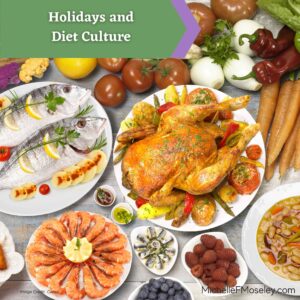Many folks in the US are preparing to gather for Thanksgiving next week. That late-November celebration is often the beginning of multiple holiday-related celebrations that include food, family, and diet culture.

What is Diet Culture?
Diet culture is all around us, and it encompasses a multitude of messages. Here are a few aspects of diet culture:
- A belief that physical appearance is more important than overall well-being.
- A hierarchical view of bodies, generally placing thin, white bodies at the top.
- Anti-fat bias (fat phobia) which means that those in larger bodies are treated poorly, judged, and often excluded from a variety of things. This exclusion can include lack of accessible seating, inability to enjoy traveling or events due to lack of accessibility, and avoidance of medical care due to previous harmful experiences with providers.
- Promotion of restrictive, rigid, and disordered rules around food and exercise. The marketing of these products or plans often include the words “clean”, “wellness”, or “lifestyle” and promise unsustainable results.
How Diet Culture Can Show Up During Holidays?
Holiday celebrations often include food. No matter the specific holiday, there are frequently certain dishes that are associated with that celebration. For some, the food is the highlight of the celebration. Maybe it’s grandma’s delicious pie that you only have once a year. Maybe it’s a dish that is tied to your cultural roots and holds deep meaning for the occasion. Humans enjoy celebrating with food.
Unfortunately, where there is food, there is often diet culture.
Here a few ways that diet culture can show up during your holiday celebrations:
COMMENTS FROM OTHERS. “I didn’t eat all day to save calories for this meal.” “I’m gonna have to workout an extra hour tomorrow to make up for this second helping.” “Are you sure you should be eating that?”
These are just some of the comments that you may hear from friends or family during your holiday celebrations. You may have even said some version of these things yourself.
These thought patterns are all part of diet culture. The restriction around calories, the idea of “making up for” or “earning” your food, the judgement around eating certain things or the amount someone eats are all rooted in a belief that physical appearance is the most important thing about a person. Layer that with the idea that certain bodies are more acceptable than others, and you have a perfect storm for creating these rules, judgements, and comments.
COMMERCIALS / MARKETING. The messages continue via both traditional advertisements and online marketing. The “miracle lifestyle changes” are promoted by everyone from your favorite reality TV star via their social media platform to that person you haven’t spoken to since high school who sends you a message telling you about their new product (generally from a multi-level marketing company) that will help you slim down and avoid weight gain during the holidays.
The messages can leave you questioning your body and self-worth, even if you weren’t struggling with body image before seeing them. They also generally involve you spending some money on a shake, powder, video, etc.
The marketing can also be confusing. You’re supposed to enjoy your holiday foods and even indulge in some special “treats.” You’re also supposed to drink some powdered shake and not eat any fruit and be sure to count those calories. No wonder we can feel all our of sorts around food and our bodies this time of year!
INTERNAL SHAME AND JUDGEMENT. The thoughts that come from inside ourselves can add to the external comments and messages. The internal sense of shame or judgement can sometimes feel even worse than what comes from others! And it’s often rooted in the external messages we’ve gotten about food and our bodies.
What does this internal shame look like? Questioning your worth based on the number on a scale or the size of your clothing. Forcing yourself to restrict food in an effort to shrink your body. Deciding not to take part in an event you’ve looked forward to all year because you feel that your body makes you unworthy of being there. Judging every bit of food or drink you consume and comparing that to what others consume with no consideration of your personal bodily needs. That doesn’t sound celebratory at all!
Uninvite Diet Culture from Your Celebrations
This can be the year that you let diet culture know it is not welcome! Not welcome at your holiday celebrations. Maybe you’ll even decide diet culture is not welcome in your life at all!
Here are some ideas for uninviting diet culture from your celebrations:
- Communicate boundaries related to comments about food and diet. You may choose to say something before the event like, “This year we’re going to focus on enjoying our celebration and our food. Please refrain from commenting on bodies, calories, and amounts or types of food eaten by yourself or others.” You may want to respond to any comments that are made with something along the lines of, “Please do not comment on my food or my body (or my child’s food or body).”
- Bring “non-dietified” foods for all to enjoy. Holiday celebrations are not the time to force yourself to eat cauliflower rice. If you want cauliflower, eat cauliflower. If you want rice, eat rice. No need to try to force one thing to try to be another in the same of some diet. You can contribute to the celebration by preparing a dish that you enjoy and that holds special memories of the celebration. Bring that full-sugar pecan pie you remember from childhood. Enjoy the homemade bread that makes the meal so special. De-dietify your celebration.
- Enjoy your food. Get a portion of all the things you enjoy. Focus on taking your time to eat each thing. When you notice thoughts related to the amount of food or the number of calories, simply label them as “diet thought” and take your focus right back to enjoying your food. Enjoying your food also means not starving yourself before the meal, and being aware when your body is satisfied so you don’t feel physically ill after the meal.
- Enjoy your people. Whether you’re gathering with friends, family, co-workers, or neighbors, focus on enjoying the time with your people. Talk about what the past year has brought each of you. Play a game together. And, if you happen to be spending the holiday alone, focus on enjoying your day. Do something just for you. Binge that show you’ve been wanting to watch. Don’t like the “traditional” holiday foods? Eat something you like. Read a book, take a bubble bath, work on a fun project. Enjoy being with you.
- View movement as pleasant, not punishment for eating. Maybe you decide to talk a walk during the holiday. Check in with yourself and ask, “am I doing this to “earn” some extra calories?” Try to shift your mindset to moving your body because: you like how it feels to move and stretch, you want to enjoy some fresh air, you need some time away from all the family members, you know your teenage niece is more likely to talk if ya’ll are doing an activity together. Movement is a way to connect with your body, not a punishment for eating food.
Hopefully this post got you thinking about how diet culture may impact your holiday celebrations. Maybe you also feel more equipped to let diet culture know it’s not invited to the party!
If you’re located in North Carolina and dealing with concerns related to body image and the impact of diet culture, I provide individual counseling to support folks with these concerns. You can learn more about Body Image Counseling on my website. Feel free to contact me to schedule a free, 15-minute consultation if you’re interested in counseling.
Wishing you “Happy Holidays” no matter what you may celebrate!
Michelle F. Moseley is a Licensed Mental Health Counselor in NC. She believes ALL people deserve respect, compassion, and access to mental and physical healthcare. Michelle specializes in working with survivors of religious trauma and with those who have body image concerns, finding there is frequent overlap in these areas. You can learn more about Michelle by visiting her website at MichelleFMoseley.com or following her on Instagram – @therapy_with_michelle


